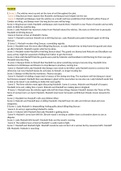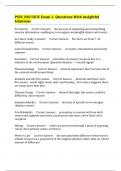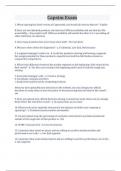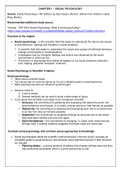Macbeth
1 Scene 1: The witches meet up and set the tone of evil throughout the plot.
Scene 2: King Duncan hears reports that Macbeth and Banquo have helped win the war.
Scene 3: Macbeth and Banquo meet the witches on a heath and hear predictions that Macbeth will be Thane of
Cawdor and King, and Banquo won’t be king but his sons will be kings.
Scene 4: King Duncan meets Macbeth and Banquo and rewards them. Macbeth is now Thane of Cawdor and secretly
starts to think he could be king.
Scene 5: Lady Macbeth has received a letter from Macbeth about the witches. She starts to think how to persuade
Macbeth to kill King Duncan.
Scene 6: Duncan arrives at Macbeth’s home.
Scene 7: Macbeth convinces himself not to kill King Duncan. Lady Macbeth persuades Macbeth again to kill King
Duncan.
2 Scene 1: Macbeth murders King Duncan, committing regicide.
Scene 2: Macbeth loses his nerve after killing King Duncan, so Lady Macbeth has to help frame the guards and clean
up after Macbeth. Macbeth regrets what he has done.
Scene 3: Macbeth sends Macduff to find King Duncan dead. The guards are blamed and Malcolm and Donalbain run
away as they might be suspected of killing their father to get the throne.
Scene 4: Ross and Macduff think the guards were paid by Malcolm and Donalbain to kill the king for their own gain.
Macbeth becomes king.
3 scene 1: Banquo thinks to himself that Macbeth has done something wrong to become king. Macbeth hires
murderers to kill Banquo and Fleance to stop Banquo’s prophecy coming true.
Scene 2: Macbeth tells Lady Macbeth that Banquo now needs to be killed. Lady Macbeth wants to convince him
otherwise, but now Macbeth keeps his evil plans to himself, no longer trusting her.
Scene 3: Banquo is killed by the murderers. Fleance escapes.
Scene 4: Macbeth is holding a large meal in honour of him being new king. The murderers tell him Banquo is dead
but Fleance escaped. Macbeth then sees Banquo’s ghost at the meal when no one else can. Lady Macbeth sends him
to bed so he doesn’t say anything to make him seem guilty.
Scene 5: The three witches meet again discussing Macbeth. Scene 6: Lennox, Malcolm and Macduff all suspect
Macbeth to be evil, calling him a tyrant. Malcolm and Macduff are making plans in England.
4 Scene 1: Macbeth sees the witches again who tell him these things: Beware Macduff, beware the Thane of Fife,
None of woman born can harm Macbeth, Macbeth shall never be beaten until Birnam Woods moves towards the
castle
Scene 2: Macbeth has Macduff’s wife and children killed.
Scene 3: Malcolm and Macduff plan on killing Macbeth. Macduff hears his wife and child are dead and vows
vengeance.
5 Scene 1: Lady Macbeth is sleepwalking, feeling guilty about killing King Duncan
Scene 2: An army is approaching Macbeth’s castle.
Scene 3: A doctor tells Macbeth that Lady Macbeth is getting worse.
Scene 4: Macbeth’s army have left him. Birnam wood is moving as soldiers have cut branches down to use as
disguise.
Scene 5: Lady Macbeth kills herself. Macbeth finds out the wood is moving.
Scene 6: The soldiers have arrived at Macbeth’s castle ready to fight.
Scene 7: Macduff and Macbeth fight. Macduff reveals he was not born of a woman but by caesarean birth. Macduff
kills Macbeth. Malcolm is now king.
, Themes
Ambition - The play shows that ambition is dangerous Loyalty and Betrayal - Loyalty is rewarded in the play and
because it can go out of control. Macbeth’s ambition betrayal is punished. Macbeth is loyal to King Duncan and is
leads him to kill King Duncan and Banquo. Lady rewarded with the new title of Thane of Cawdor. Later on,
Macbeth’s ambitions leads to her insanity later on in Macbeth and Lady Macbeth pretend to be loyal in order to
the play. It can be good, such as Banquo’s ambition for betray King Duncan.
his sons to be king because he does not act violently
on this like Macbeth does. Kingship - A good king should be calm, humble, loyal and
believe in fair justice much like King Duncan. A bad king is one
Reality and Appearance - The play deals with the
who is selfish, greedy, a liar and violent most of the time,
ideas of appearances being deceptive. Macbeth
much like Macbeth. Kings should also be chosen by God under
and Lady Macbeth hide their true thoughts when
Divine Right.
killing King Duncan. The Witches words are
deliberately unclear creating uncertainty in the
play. King Duncan trusts appearances too much, Fate and Free Will - Do we have total control over our
but Banquo and Malcom are sceptical. future, or are things already planned for us? Macbeth
deals with this question when the Witches prophesise him
Supernatural The supernatural deals with powers becoming king. Macbeth uses his free will to make his fate
that cannot be explained normally with ideas of come true. Banquo, on the other hand , would rather fate
magic. The Witches are an evil supernatural force take its own course.
and bring chaos to the play, creating an
unnatural order.
Context
Patriarchy - Women not as important as men Jacobean men held women responsible for the original sin (Adam & Eve)
Divine Rights of Kings: God like status of Kings meaning that they should not be killed
Monarchy: King James 1st was hugely interested in Witchcraft & wrote Daemonologie
Treason – Gunpowder Plot
Religion – The catholic/ protestant divide and suspicion this caused
The Great Chain of Being – a hierarchy in Christianity that starts with God
The Code of Chivalry – a moral conduct that included behaviour towards women and went beyond the battlefield
King James I – Macbeth was written in 1606, early in the reign of James I, who succeeded to the English throne in 1603 after being King of
Scotland. The play pays homage to the king’s Scottish lineage and hatred of witches. Additionally, the witches’ prophecy that Banquo will
found a line of kings is a nod to James’ family’s claim to have descended from the historical Banquo.
The Divine Right of Kings – the idea that kings got their power from God and not from their subject. James I was a believer in this, and the
idea meant that any treasonous activity was a crime against God. Only a century earlier, England had suffered under the massive disorder of
the Wars of the Roses, so many supported the idea to avoid civil unrest.
Patriarchy – patriarchal societies are those in which men dominate, and inheritance passes through male heirs.
Gender – Macbeth and Lady Macbeth switch between having masculine and feminine characteristics. In the play, gender is often linked to
ambition and a willingness to do anything to achieve power
. Women – Women were expected to follow social expectations with their behaviour towards men. They were meant to obey all men, be
faithful and respectful, not be violent and be religious. They would have been regarded as a possession, first owned by the father, then given
to and owned by the husband. Women were considered the delicate, ‘fairer’ sex and they should be quiet and reserved, always respecting the
wishes and opinions of the males in their lives. Lady Macbeth subverts these expectations in the play to manipulate Macbeth in getting what
she wants.
Adam, Eve and the serpent – in the bible, Adam and Eve live peacefully in the Garden of Eden until Eve is tempted by the
serpent and eats the forbidden fruit from the tree of knowledge. She convinces Adam to eat as well, and God curses them and
banishes them to Earth. The serpent is frequently alluded to in Macbeth .
Witchcraft – in Shakespeare’s time there was no scientific knowledge to explain natural disasters such as earthquakes, floods and droughts.
One of the ways they accounted for the unexplained was the idea of witches. In Elizabethan England, hundreds of thousands of women were
tortured and executed in Europe because they were accused of witchcraft. The King wrote a book on the subject entitled ‘Daemonologie’ and
appealed to parliament to pass the following act in 1563 which was still a part of English law until 1951. At the time Shakespeare was writing,
many people thought that witches were real, so the weird sisters would have seemed believable and frightening to an audience in the 1600s.
The 5 Acts: Macbeth is a typical tragedy. The first part builds up the turning point (Duncan’s murder), and the second part
deal with the consequences of this, which leads to the main character’s downfall
. Tragic Conventions: Macbeth is one of Shakespeare’s Tragedies and follows specific conventions. The climax must end in a
tremendous catastrophe involving the death of the main character; the character’s death is caused by their own flaw(s)
(hamartia); the character has something the audience can identify with which outweighs their flaws so we care about them.
The Real Macbeth: Macbeth is loosely based on true events in feudal Scotland in the 11th Century and would have been
known to King James. King James inherited the throne through his ancestors Banquo and Fleance who appear in the play.
1 Scene 1: The witches meet up and set the tone of evil throughout the plot.
Scene 2: King Duncan hears reports that Macbeth and Banquo have helped win the war.
Scene 3: Macbeth and Banquo meet the witches on a heath and hear predictions that Macbeth will be Thane of
Cawdor and King, and Banquo won’t be king but his sons will be kings.
Scene 4: King Duncan meets Macbeth and Banquo and rewards them. Macbeth is now Thane of Cawdor and secretly
starts to think he could be king.
Scene 5: Lady Macbeth has received a letter from Macbeth about the witches. She starts to think how to persuade
Macbeth to kill King Duncan.
Scene 6: Duncan arrives at Macbeth’s home.
Scene 7: Macbeth convinces himself not to kill King Duncan. Lady Macbeth persuades Macbeth again to kill King
Duncan.
2 Scene 1: Macbeth murders King Duncan, committing regicide.
Scene 2: Macbeth loses his nerve after killing King Duncan, so Lady Macbeth has to help frame the guards and clean
up after Macbeth. Macbeth regrets what he has done.
Scene 3: Macbeth sends Macduff to find King Duncan dead. The guards are blamed and Malcolm and Donalbain run
away as they might be suspected of killing their father to get the throne.
Scene 4: Ross and Macduff think the guards were paid by Malcolm and Donalbain to kill the king for their own gain.
Macbeth becomes king.
3 scene 1: Banquo thinks to himself that Macbeth has done something wrong to become king. Macbeth hires
murderers to kill Banquo and Fleance to stop Banquo’s prophecy coming true.
Scene 2: Macbeth tells Lady Macbeth that Banquo now needs to be killed. Lady Macbeth wants to convince him
otherwise, but now Macbeth keeps his evil plans to himself, no longer trusting her.
Scene 3: Banquo is killed by the murderers. Fleance escapes.
Scene 4: Macbeth is holding a large meal in honour of him being new king. The murderers tell him Banquo is dead
but Fleance escaped. Macbeth then sees Banquo’s ghost at the meal when no one else can. Lady Macbeth sends him
to bed so he doesn’t say anything to make him seem guilty.
Scene 5: The three witches meet again discussing Macbeth. Scene 6: Lennox, Malcolm and Macduff all suspect
Macbeth to be evil, calling him a tyrant. Malcolm and Macduff are making plans in England.
4 Scene 1: Macbeth sees the witches again who tell him these things: Beware Macduff, beware the Thane of Fife,
None of woman born can harm Macbeth, Macbeth shall never be beaten until Birnam Woods moves towards the
castle
Scene 2: Macbeth has Macduff’s wife and children killed.
Scene 3: Malcolm and Macduff plan on killing Macbeth. Macduff hears his wife and child are dead and vows
vengeance.
5 Scene 1: Lady Macbeth is sleepwalking, feeling guilty about killing King Duncan
Scene 2: An army is approaching Macbeth’s castle.
Scene 3: A doctor tells Macbeth that Lady Macbeth is getting worse.
Scene 4: Macbeth’s army have left him. Birnam wood is moving as soldiers have cut branches down to use as
disguise.
Scene 5: Lady Macbeth kills herself. Macbeth finds out the wood is moving.
Scene 6: The soldiers have arrived at Macbeth’s castle ready to fight.
Scene 7: Macduff and Macbeth fight. Macduff reveals he was not born of a woman but by caesarean birth. Macduff
kills Macbeth. Malcolm is now king.
, Themes
Ambition - The play shows that ambition is dangerous Loyalty and Betrayal - Loyalty is rewarded in the play and
because it can go out of control. Macbeth’s ambition betrayal is punished. Macbeth is loyal to King Duncan and is
leads him to kill King Duncan and Banquo. Lady rewarded with the new title of Thane of Cawdor. Later on,
Macbeth’s ambitions leads to her insanity later on in Macbeth and Lady Macbeth pretend to be loyal in order to
the play. It can be good, such as Banquo’s ambition for betray King Duncan.
his sons to be king because he does not act violently
on this like Macbeth does. Kingship - A good king should be calm, humble, loyal and
believe in fair justice much like King Duncan. A bad king is one
Reality and Appearance - The play deals with the
who is selfish, greedy, a liar and violent most of the time,
ideas of appearances being deceptive. Macbeth
much like Macbeth. Kings should also be chosen by God under
and Lady Macbeth hide their true thoughts when
Divine Right.
killing King Duncan. The Witches words are
deliberately unclear creating uncertainty in the
play. King Duncan trusts appearances too much, Fate and Free Will - Do we have total control over our
but Banquo and Malcom are sceptical. future, or are things already planned for us? Macbeth
deals with this question when the Witches prophesise him
Supernatural The supernatural deals with powers becoming king. Macbeth uses his free will to make his fate
that cannot be explained normally with ideas of come true. Banquo, on the other hand , would rather fate
magic. The Witches are an evil supernatural force take its own course.
and bring chaos to the play, creating an
unnatural order.
Context
Patriarchy - Women not as important as men Jacobean men held women responsible for the original sin (Adam & Eve)
Divine Rights of Kings: God like status of Kings meaning that they should not be killed
Monarchy: King James 1st was hugely interested in Witchcraft & wrote Daemonologie
Treason – Gunpowder Plot
Religion – The catholic/ protestant divide and suspicion this caused
The Great Chain of Being – a hierarchy in Christianity that starts with God
The Code of Chivalry – a moral conduct that included behaviour towards women and went beyond the battlefield
King James I – Macbeth was written in 1606, early in the reign of James I, who succeeded to the English throne in 1603 after being King of
Scotland. The play pays homage to the king’s Scottish lineage and hatred of witches. Additionally, the witches’ prophecy that Banquo will
found a line of kings is a nod to James’ family’s claim to have descended from the historical Banquo.
The Divine Right of Kings – the idea that kings got their power from God and not from their subject. James I was a believer in this, and the
idea meant that any treasonous activity was a crime against God. Only a century earlier, England had suffered under the massive disorder of
the Wars of the Roses, so many supported the idea to avoid civil unrest.
Patriarchy – patriarchal societies are those in which men dominate, and inheritance passes through male heirs.
Gender – Macbeth and Lady Macbeth switch between having masculine and feminine characteristics. In the play, gender is often linked to
ambition and a willingness to do anything to achieve power
. Women – Women were expected to follow social expectations with their behaviour towards men. They were meant to obey all men, be
faithful and respectful, not be violent and be religious. They would have been regarded as a possession, first owned by the father, then given
to and owned by the husband. Women were considered the delicate, ‘fairer’ sex and they should be quiet and reserved, always respecting the
wishes and opinions of the males in their lives. Lady Macbeth subverts these expectations in the play to manipulate Macbeth in getting what
she wants.
Adam, Eve and the serpent – in the bible, Adam and Eve live peacefully in the Garden of Eden until Eve is tempted by the
serpent and eats the forbidden fruit from the tree of knowledge. She convinces Adam to eat as well, and God curses them and
banishes them to Earth. The serpent is frequently alluded to in Macbeth .
Witchcraft – in Shakespeare’s time there was no scientific knowledge to explain natural disasters such as earthquakes, floods and droughts.
One of the ways they accounted for the unexplained was the idea of witches. In Elizabethan England, hundreds of thousands of women were
tortured and executed in Europe because they were accused of witchcraft. The King wrote a book on the subject entitled ‘Daemonologie’ and
appealed to parliament to pass the following act in 1563 which was still a part of English law until 1951. At the time Shakespeare was writing,
many people thought that witches were real, so the weird sisters would have seemed believable and frightening to an audience in the 1600s.
The 5 Acts: Macbeth is a typical tragedy. The first part builds up the turning point (Duncan’s murder), and the second part
deal with the consequences of this, which leads to the main character’s downfall
. Tragic Conventions: Macbeth is one of Shakespeare’s Tragedies and follows specific conventions. The climax must end in a
tremendous catastrophe involving the death of the main character; the character’s death is caused by their own flaw(s)
(hamartia); the character has something the audience can identify with which outweighs their flaws so we care about them.
The Real Macbeth: Macbeth is loosely based on true events in feudal Scotland in the 11th Century and would have been
known to King James. King James inherited the throne through his ancestors Banquo and Fleance who appear in the play.






